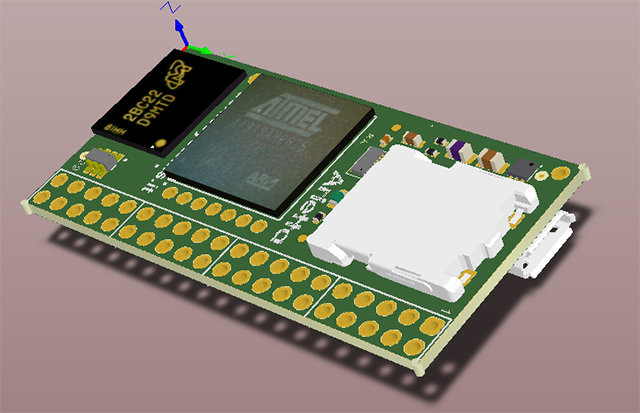Acme Systems Aria G25 is a tiny system-on-module (SoM) based on Atmel SAM9G25 that sells for as low as 24 Euros. The company is now working on an smaller and lower cost ARM Linux module based on the same processor called Arietta G25. The board targets the hobbyist market and IoT (Internet of Things) applications.
- CPU – Atmel AT91SAM9G25 ARM9 @ 400Mhz
- System Memory – 128 MB DDR2
- Storage – MicroSD Socket for up to 32GB bootable Linux microSD (not included)
- I/Os and other available pins (via 2.54mm though holes):
- USB – 1x USB 2.0 host/device (High Speed), 1x USB 2.0 host(HS), 1x USB 2.0 host (FS)
- Serial – 1x UART (RXD,TXD,RTS,CTS), 1x I2C, 1x SPI bus 1 with 2 chip select (5 to 50 MHz)
- 4x PWM
- 4x 10-bit A/D converters
- 1-wire bus
- 5V, 3.3V, GND, VBATT signals
- Header for Wi-Fi module
- Power – Single 3.3 Volt DC, Line levels: TTL 3.3V (NOT 5V tolerant)
- Dimensions – 25x51mm
- Temperature range – -20 +70 °C (Operating)
Since this is early stage of development, no documentation is available, but we do have some informations about Aria G25 support. You can build the latest Linux kernel (3.12.8 release, or 3.13r8) for the board, lots of tutorials are provided, including one explaining how to create an Embedded Debian Grip 7.2 image. The board is not open source hardware, but the company provides some hardware documentation. Finally, support is available via Google Groups.
If you’ve been using a Raspberry Pi, or BeagleBone Black for your headless embedded project, but do not need much processing power, and/or need lower power consumption, Arietta G25 could be an option to consider.
The only problem is that you’ll need to wait a little while, because the module will only ship in June 2014. The price will be 9.99 Euros for orders made before May 2014, and after the board will sell for a regular price of 19.98 Euros. The board will show up on Acme Systems eShop when it becomes available.
Further information is available on the blog of one of Acme Systems’ owners (Roberto Asquini).

Jean-Luc started CNX Software in 2010 as a part-time endeavor, before quitting his job as a software engineering manager, and starting to write daily news, and reviews full time later in 2011.
Support CNX Software! Donate via cryptocurrencies, become a Patron on Patreon, or purchase goods on Amazon or Aliexpress






Are there “real” USB connectors, or just pins?
With real USB connectors it will be easy to connect a USB Wifi device for ethernet connectivity.
@Sander
Only pin. You’d have to solder you own things.
You can see 7 pins right under Atmel CPU, that’s to connect a Wi-Fi module, but they did not provide details about the module yet.
How many GPIOs?
@zoobab
According the pinout on their blog, there aren’t any. But I’d assume some of the serial protocol pins (I2C, UART, SPI..) can also be configured as GPIO. (TBC). I’ll ask them.
@cnxsoft On some SOCs, you can switch the role of each pin with a config file change in the bootloader or something.
@cnxsoft
The 7 pins are for this cheap (Euro 7.00) module: http://www.acmesystems.it/WIFI-2
Anyway the USB pins are all brought out, so you have up to three USB host ports.
@zoobab
I got an answer about GPIOs:
We defined right today a pin selection to wire from the Atmel MPU to the external pads
http://www.acmesystems.it/arietta
It is possible to have up to 28 GPIO lines if you define (using the .dts file) all the lines as GPIOs
By default we’ll have:
4 A/D input line
1 I2C bus
3 USART (1 with RTS, CTS)
1 SPI (up to 3 CS)
Up to 6 PWM
3 USB host port
To generate the right .dts (and very soon compile also your .dtb file)
we’ll offer a free on-line tools like this: http://builder.tanzilli.com:8080/.
@cnxsoft http://builder.tanzilli.com:8080/ gives a connexion error:
zoobab@turmes /home/zoobab [6]$ wget http://builder.tanzilli.com:8080/
–2014-01-27 15:37:18– http://builder.tanzilli.com:8080/
Resolving builder.tanzilli.com… 78.47.159.198
Connecting to builder.tanzilli.com|78.47.159.198|:8080… failed: Connection refused.
@zoobab
It’s not working for me either, and I hadn’t tried at the time.
Very interesting module but shipping prices way way too high
We are starting to ship the pre-ordered Arietta 🙂